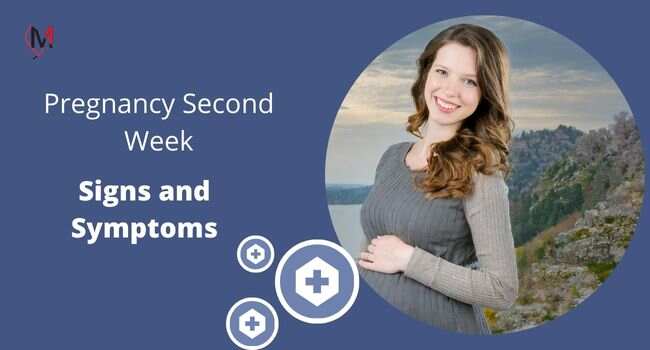Would you like to know details about the pregnancy second week? In this article, we provide comprehensive information about the second week of pregnancy, from the signs to what you should do during this week.
Table of Contents
What You Should Know: The Pregnancy Second Week
Today we are discussing. According to the week, it’s the pregnancy second week. At the outset of the second week of pregnancy, some notable points are being mentioned. At this time, there may be dimpling or ovulation. So, it is advisable for a man and a woman to time their appropriate union if they are interested in having a child. Through ovulation tests, it is possible to determine the fertile window, meaning the suitable time for conception. It is crucial to consume a considerable amount of folic acid before becoming pregnant.
Now let’s come to our main discussion, that is, the development of the embryo in the spregnancy second week. To facilitate the growth of the baby, certain preparations need to be made in the mother’s body. In recent days, due to the increase in estrogen and progesterone in the mother’s body, there has been enough support for the lining of the uterus to support the nascent embryos. At the same time, the fluid-filled cavities in the mother’s uterus, known as fallopian tubes, where embryos are transformed into blastocysts, are also developing. When ovulation occurs, a blastocyst emerges from the uterine lining and travels down the fallopian tube to become implanted.

Ovulation doesn’t always occur smack dab in the middle of the menstrual cycle, like with a 28-day cycle, it can happen anytime within 21 days to 10 days before the next cycle. Sperm entering the vagina within 24 hours after ovulation, out of the approximately 250 million sperm, if any sperm breaks through the external membrane of the egg, known as the zona pellucida, in the fallopian tube, then fertilization occurs. Sperm travel through the cervix to the fallopian tube. During this journey to the egg, only about four sperm survive by the time they reach the egg, and in many cases, only one sperm can penetrate the egg’s membrane.
When human bodies unite, called gametes, after penetrating the zona pellucida, within the next 10 to 30 hours, the sperm nucleus fuses with the egg nucleus and they combine to form the embryo’s genetic material. If the sperm carries a Y chromosome, a male embryo is formed. Conversely, if the chromosome is X, a female embryo is formed. The fertilized egg is called a zygote.
Now, let’s talk about implantation. After the formation of the zygote, within three to four days, the zygote divides into one hundred or more different cells and travels from the fallopian tube to the uterus. After entering the uterus, it’s called a blastocyst. A day after that, the blastocyst starts to embed in the lining of the uterus and gradually begins to grow. Let’s take note of these 12 days.
Common Pregnancy Symptoms in The Second Week
What are the signs of pregnancy in the second week? You may not be pregnant yet. But you might want to pay attention to some signs of ovulation. If you can accurately identify the signs of ovulation, planning when to conceive with your partner becomes easier. So, keep an eye out for signs of ovulation in yourself.
- Cervical Mucus: Cervical mucus is a type of mucus that can occasionally exit through the vaginal pathway. Around ovulation, the discharge tends to be clearer and more watery, resembling the white part of an egg.
- Mild Cramps or Pain: Many women experience abdominal cramps or momentary intense pain during ovulation. Alternatively, there may be pain on one side of the lower back.
- Increased Desire for Intimacy: Your desire for intimacy may become stronger during this time, and your body’s scent may become more enticing to your partner.
- Heightened Sense of Smell: If you find yourself highly sensitive to your partner’s scent, your body may be expressing a strong desire to unite with a partner of the opposite sex.
- Breast Sensitivity: Due to hormonal changes during ovulation, you may experience breast tenderness. They may feel fuller or have darkened nipples.
- Changes in Cervical Position: During ovulation, the cervix becomes softer and more open. These changes can be observed by inserting a finger into the vagina and feeling the cervix. Monitoring these changes daily is essential.
- Basal Body Temperature (BBT): You can determine your basal body temperature by measuring it every morning with a special thermometer. During ovulation, BBT may increase slightly and continue to rise until the next period.
What Should You Do in Pregnancy Week Two?
During the pregnancy second week, there are some things to consider. Start taking prenatal vitamins now, such as folic acid, to ensure the baby’s safe development.
Communicate with your doctor before conception and, if possible, undergo pre-conception check-ups to ensure your body is ready for pregnancy.
Some medications that cannot be taken during pregnancy may have been regularly taken by you before pregnancy. Therefore, before conception, consult your doctor to either discontinue those medications or find alternative options. If you have diabetes or high blood sugar levels, and if they are not well-controlled, they could pose a risk to your unborn child. So, start preparing now for a healthy pregnancy.
You and your partner can undergo blood tests to determine if there are any genetic diseases such as thalassemia or cystic fibrosis. These genetic diseases can be very serious, so getting a blood test done before conception can help ensure that your baby is not at risk.
Adequate rest and sleep are necessary now, and it’s essential to minimize mental stress as much as possible.
Read Also: Pregnancy first Week.
frequently asked Questions
What causes stomach pain in the Pregnancy Second Week?
Abdominal pain in the Pregnancy Second Week can be caused by implantation cramps or changes in hormone levels.
